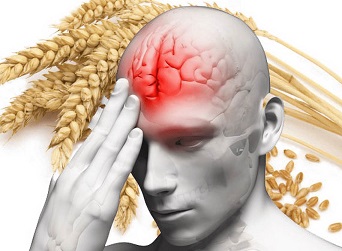Diets And Nutrition: New Zealand Study Involving Mice Shows That Gluten Causes Hypothalamic Inflammation And Brain Damage!
Thailand Medical News Team Aug 24, 2023 1 year, 7 months, 3 weeks, 6 days, 5 hours, 34 minutes ago
Diets And Nutrition plays a crucial role in human health, affecting various physiological functions, including metabolism and inflammation. A groundbreaking study conducted by researchers at the University of Otago in New Zealand has unveiled new insights into the potential impact of gluten consumption on brain inflammation and overall health. The research, led by Associate Professor Dr Alex Tups, focused on the effects of dietary wheat gluten on brain inflammation in mice. The study findings suggest that gluten, a common component of wheat, rye, and barley, could induce hypothalamic inflammation in the brain, which may have implications for human health.
 Background
Background
Gluten, a protein found in grains such as wheat, rye, and barley, constitutes a significant part of the Western diet. It has been associated with several gluten-related disorders, including coeliac disease and non-coeliac gluten sensitivity.
While previous research has linked gluten to body mass gain and inflammation in mice, this new study sought to investigate its potential effects on brain health.
The hypothalamus, a critical region in the brain, plays a crucial role in regulating metabolic functions, such as body weight and blood sugar control.
Study Methodology and Findings
In their study, the study team examined whether adding gluten to different diets affected body weight, metabolic markers, and central inflammation in male mice. The mice were fed either a low-fat diet (LFD) or a high-fat diet (HFD) enriched with 4.5% gluten, mirroring the average daily gluten consumption in humans. The results showed that while gluten did not affect body mass when added to the LFD, it did induce an increase in body weight when added to the HFD.
Of particular significance was the discovery that gluten, regardless of whether it was added to LFD or HFD, led to a significant increase in the number of microglia and astrocytes in the hypothalamic arcuate nucleus. These immune cells, similar to macrophages in the bloodstream, play a vital role in inflammation. The finding suggests the potential development of hypothalamic injury in response to gluten consumption.
Implications for Human Health
Associate Professor Dr Tups cautioned against drawing direct conclusions about the implications for human health based solely on these findings. While the
Diets And Nutrition study indicated the potential for gluten-induced hypothalamic inflammation in mice, more research is needed to ascertain whether similar effects occur in humans. Dr Tups emphasized that not everyone needs to eliminate gluten from their diets and that future studies are required to determine if the observed effects are translatable to humans and whether they have implications for gluten-sensitive individuals.
Possible Mechanisms
The mechanisms underlying gluten-induced brain inflammation are still unclear and require further investigation. The study proposed several potential pathways, including the possibility that digestion-resistant components of gluten could trigger immune responses that
manifest in the brain. Alternatively, interactions between gut microbiota and gluten consumption could play a role in promoting inflammation. The emerging connection between the gut-brain axis and its potential impact on central nervous system function adds complexity to this area of research.
Limitations and Future Directions
The study's focus on male mice is noted as a limitation, considering the prevalence of coeliac disease and gluten sensitivity in females. Additionally, the study's findings are not sufficient to recommend widespread dietary changes based solely on its results. More research, including controlled clinical trials, is required to determine the broader implications of gluten consumption for human health.
Conclusion
The University of Otago's study provides valuable insights into the potential impact of gluten consumption on brain inflammation and health. The discovery of gluten-induced astro- and microgliosis in the hypothalamus of mice raises intriguing questions about the connection between dietary choices and brain function. However, it is essential to approach these findings with caution and recognize the need for additional research to fully understand the implications for human health. As science advances, the intricate relationship between diet, inflammation, and brain health will continue to be explored, potentially leading to more personalized dietary recommendations and strategies for improved well-being.
The study findings were published in the peer reviewed Journal of Neuroendocrinology.
https://onlinelibrary.wiley.com/doi/10.1111/jne.13326
For more the latest on
Diets and Nutrition, keep on logging to Thailand Medical News.
